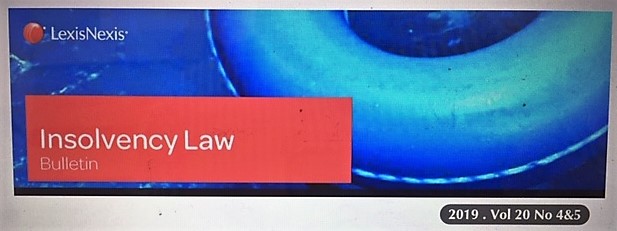An article in the forthcoming Insolvency Law Bulletin describes the proposed corporate SME insolvency reforms as Janus-faced,[1] the title referring to a claim that the content of the draft Corporations Amendment (Corporate Insolvency Reforms) Bill 2020 does not appear to match the government’s rhetoric in support of it; (odd?). That has become more apparent when the numbers involved in small to medium enterprises are examined.

In short order, the article explains that the eligibility threshold for corporate SMEs of $1m is too low; that there is inconsistency between what the government claims is a “debtor in possession” model and the duties and responsibilities imposed on the small business restructuring practitioner; and that the government, far from creating a streamlined process, is creating a legislative maze in leaving much of the substantive law to the regulations.
Describing the Bill as “neither fish nor fowl”, the author concludes that, on what we have at the moment (noting that it is a draft, and without the supporting regulations), the claims made in its favour by the government “appear to be cosmetic and overstated.”
The author might have added that the reforms purport to address only a minority of SME businesses in any event, and those that can pay.
Adapting the title of a colleague’s article written in another context, I suggest it is a case of Insolvency? it’s all about the money.[2]. See Do the Australian small to medium business insolvency reforms add up?

But that article is gentle compared with the criticism of the decision of the Victorian Court of Appeal in Cant v Mad Brothers Earthmoving Pty Ltd which, as our author claims, means that “we have now reached the point where the voidable preference provisions in both personal and corporate insolvency are ineffectual and easily avoided by insolvent debtors wishing to “prefer” one or more of their creditors”.
The claimed inconsistency between the Victorian Courts and the Federal Court on a national law leads to a suggestion in the Bulletin’s editorial that appeal courts should comprise judges from both jurisdictions.
But that would not have helped problems years ago about bankruptcy notices that arose in the Federal Court, when eleven judges in total taking one view as to principles concerning their validity, lined up against seven taking another. Then the High Court intervened. See Bankruptcy notices: professional mistakes, judicial confusion and legislative complexity: (2001) 1(6) INSLB 99.

And s 120 is not a clear as it should be, as a further article explains.
This is despite its redrafting in the 1990s which sought to break away from the old concept of the term “settlement”, requiring the transferor to have contemplated the retention of the relevant property by the transferee, thereby excluding money. Our article asks whether section 120 as it now appears does now create an in personam right of recovery against the recipient of the money or whether that money needs to still remain in the hands of the recipient to be recoverable. The author reveals some policy complexities. For example, “if it is decided to specify that property needs to be retained by a transferee … then that could penalize the careful family member who has invested the money wisely. On the other hand, where money has been spent and is no longer available that could reward the spendthrift”.
A fourth article examines a recent appeal decision in respect of examination summonses sought by aggrieved shareholders of Arrium to assist them in proposed litigation in relation to Arrium’s capital raising in 2014, which the Court found were not within the purposes for which such examination powers are conferred.
Michael Murray, co-editor, Insolvency Law Bulletin
[1] Two-faced; hypocritical; deceitful, Collins English Dictionary.
[2] “Insolvency – It’s all About the Money” [2018] UMelbLRS 6, Helen Anderson.



